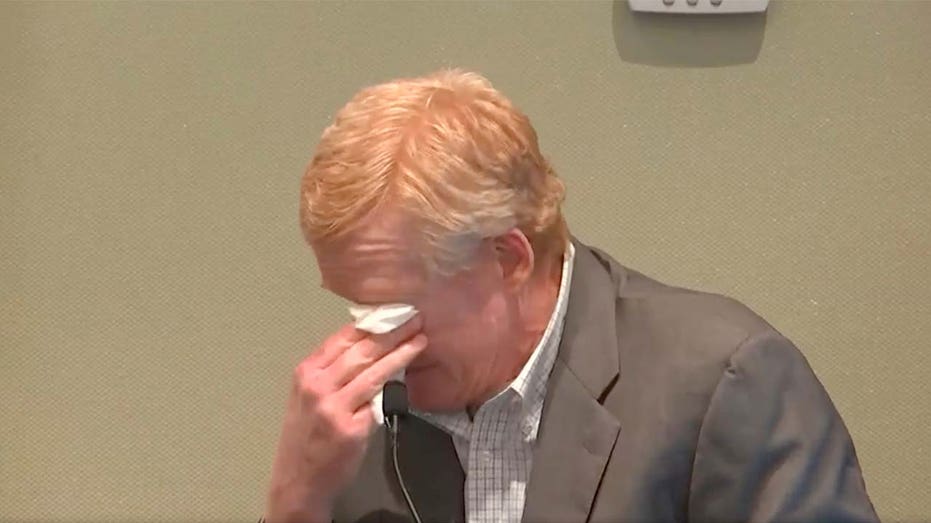
Prosecutors accused Alex Murdaugh Friday of making a series of phone calls after murdering his wife and son in order to "manufacture an alibi."
Murdaugh's cellphone went dark for about an hour on June 7, 2021, starting at 8:08 p.m.
Prosecutors say he shot and killed his son, Paul, and his wife, Maggie, at about 8:50 p.m. June 7, 2021.
Starting at 9:02 p.m., Murdaugh's phone became active again and data shows he made a flurry of calls and took about 300 steps in the subsequent four minutes.
"At 9:02 you finally have the phone in your hand, moving around and making all these phone calls to manufacture an alibi, is that not true?" asked lead prosecutor Creighton Waters.
ALEX MURDAUGH: TIMELINE OF ONCE-POWERFUL SOUTH CAROLINA LAWYER'S SPECTACULAR DOWNFALL
"That's absolutely incorrect," Murdaugh testified in the Walterboro, South Carolina, courtroom during a grueling cross-examination.
Murdaugh couldn’t explain what he was doing during that four-minute window to generate so much movement.
Murdaugh denied fatally shooting Paul, 22, and Maggie, 52, near the dog kennels at their hunting estate in Islandton, South Carolina, when he took the stand Thursday in his own defense.
But Waters spent more than three hours Friday morning peppering an increasingly fatigued Murdaugh with questions and methodically challenging his ever-changing account of what happened the night of the murders.
The first time Murdaugh claimed publicly he was at the dog kennels the night of the slayings was when he testified, he conceded on cross.
"So we can agree that the prosecution and law enforcement and so many of your friends and family heard for the first time your story about the kennels yesterday?" asked Waters.
"Yes, I agree with that," Murdaugh replied in his southern drawl.
The disgraced scion of a once-powerful legal dynasty admitted on direct examination that he repeatedly told investigators, friends and family that he was never at the dog kennels the night of the murders.
However, a cellphone video later recovered from Paul's phone captured his voice at the kennels at 8:44 p.m., contradicting Murdaugh's alibi and placing him at the murder scene minutes before the killings.
Murdaugh told the Colleton County jury he lied because he did not trust investigators and his opioid addiction made him paranoid.
"You, like you have done so many times in your life, had to back up and make a new story to fit with the facts?" Waters pressed.
"No, sir," Murdaugh replied.
Waters blasted Murdaugh for telling jurors he'd been cooperative with investigators when he had lied about his whereabouts the night of the slayings.
"Other than lying to them about going to the kennel, I was cooperative in every aspect of this investigation," Murdaugh insisted.
"Very cooperative except for maybe the most important fact of all – that you'd been at the murder scene with the victims just minutes before they died?" Waters probed.
"I did not tell them that I went to the kennel," Murdaugh acknowledged.
Waters zeroed in on the night's tight timeline.
After Paul recorded the cellphone video, Murdaugh said he removed a chicken from the mouth of their yellow lab, Bubba, and returned to the main residence at around 8:47 p.m.
Murdaugh started up his Chevrolet Suburban at 9:06 p.m. and drove to his ailing mother’s home in nearby Almeda.
Upon his return, he didn’t find Paul and Maggie at the main house so drove down to the kennels where he said he found the gruesome scene at 10:05:57 p.m.
Twenty seconds later, he called 911 and told the dispatcher that he had checked the pulses of his wife and son, who were 30 feet apart, and had been "badly shot."
"You got out of the car, according to what you told law enforcement repeatedly, and went and checked the bodies, correct? Before you called 911. Is that correct?" asked Waters.
"No, sir, that is not correct," Murdaugh said, weeping. Waters accused him of changing his story yet again after being confronted with data that doesn’t support his initial claim.
Murdaugh also admitted during questioning that he stole $3.7 million in client money in 2019 — the same year that Paul drunkenly crashed his boat into a bridge.
The collision killed 19-year-old Mallory Beach and triggered a wrongful death lawsuit.
"You agree with me that, that figure in 2019 was generally higher than any other year that you've been stealing since 2011?" asked Waters.
"Sure, I'd agree with that," Murdaugh said.
Murdaugh acknowledged that his legitimate income had been decreasing as the amount he stole increased in the time leading up to the double murder.
Waters asked Murdaugh about his opioid addiction. "Opiates gave me energy," Murdaugh told jurors.
He said he was taking between 1,000 to 2,000 milligrams of oxycodone a day. The maximum recommended dose for pain is 288 milligrams, according to the Mayo Clinic's website.
He was often paranoid because he always had pills on him, he testified.
"I had a pocket full of pills on June the 8 when I was sitting in David Owen's patrol car," he said of his interview with South Carolina Law Enforcement Division agents hours after the bloodbath.
On cross-examination, Waters spent most of his time Thursday afternoon grilling Murdaugh about the millions he swindled from his clients to fund a lavish lifestyle.
ALEX MURDAUGH'S SLAIN SON, PAUL, ALLEGEDLY STRANGLED EX-GIRLFRIEND
"You had to sit down and look somebody in the eye and convince them that you were on their side when you were not?" Waters asked, referring to the vulnerable clients Murdaugh ripped off.
"That’s what you did in every single one of these [cases]?" Waters said waiving a stack of papers.
Murdaugh repeatedly acknowledged his cons, but Waters insisted on walking him through the most egregious examples, including stealing from a teen girl and a quadriplegic man.
Prosecutors have argued that Murdaugh killed his wife and son to deflect from his theft of nearly $9 million from his law firm and clients.
Source Link
